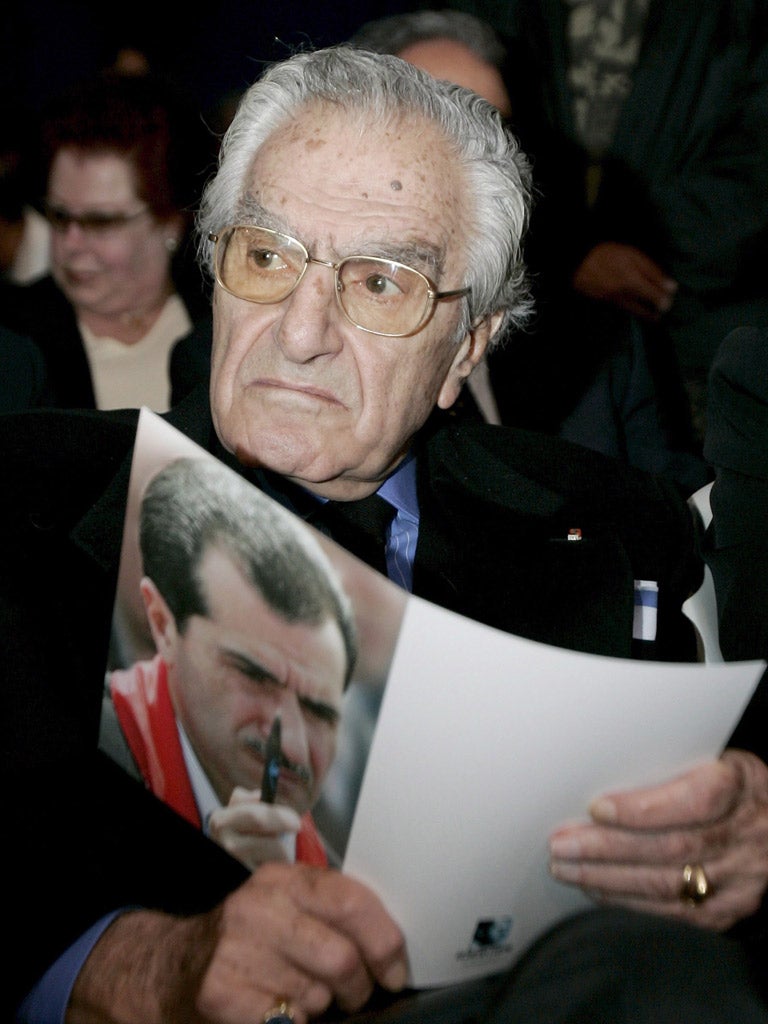Ghassan Tueni: Journalist and politician who fought oppression

Lebanon has a way of sending its icons to the grave with rather a lot of honours, but Ghassan Tueni was a brave journalist in an often grubby profession. A man of immense kindness and deep religious piety, he will forever be remembered for his words at the funeral of his assassinated son in 2005: "Let us bury hatred and revenge along with Gebran." He lost his first wife and his daughter to cancer, another son to a road accident and then Gebran to – well, dare we suggest the Syrians? – a bomb which atomised him on the outskirts of Beirut
Certainly, Tueni's an-Nahar newspaper was a beacon against oppression – and the self-oppression which the Arabs practiced so well under our tutelage – although Syria's own tragedy has now deeply affected many Lebanese, not least its journalists. Tueni, a Greek Orthodox in a country where religion is as much a part of a citizen's heritage as their blood group, was originally of Syrian extraction. But Tueni was more than a writer. He was a diplomat at the UN, politician, a wicked chaser of scandal and a clairvoyant who sometimes got it a bit wrong.
When US Marines arrived in Beirut in 1982, he predicted to an American colleague that "the Che Guevara era of Lebanese politics is over. People have had their fling with radicalism. Beards and jeans are out now. Neckties are in." Lebanon promptly sank into a very bearded world indeed, in which radicalism was nailed to Islam as surely as Tueni's polite world of politicking faded away.
The age of the technocrats eventually took over the country in which Tueni was born 86 years ago, leaving him with the trail of dignity heaped upon him in Beirut last week. He was a figure from Greek tragedy, the Beirut press announced, a Sisyphus – and he did spend a lot of his time valiantly rolling stones up hills – and a Tiger in the mould of the old President Camille Chamoun (or, one supposes, Clemenceau). President Michel Sleiman placed the Order of the Cedar upon Tueni's coffin, which was ceremoniously taken into the editorial offices of his newspaper for the very last time, along with a clutch of priests, bishops and attendant lords. No Fleet Street proprietor ever got that honour.
He had been a minister, a parliament member, a doughty fighter against censorship – and was banged up in jail several times for his battle against this ever-present Middle Eastern institution. When Antun Saada was sent off for execution without so much as a trial after the outrageous decision by Bechara al-Khoury and Riad el-Solh to do away with him after a supposed coup attempt, Tueni published a magnificent and excoriating piece of journalism which Patrick Seale recalls in his magnificent biography of el-Solh.
"The public does not know whether Antun Saada was executed or assassinated, whether it was a trial or a plot... But Antun Saada did not spark a revolt for the sake of a revolt, nor did he incite his followers to attack, rebel and commit crimes for the pleasure of attacking, rebelling and killing. No! Antun Saada was a man with a doctrine, the bearer of a message, the leader of an organised political party. But the Court chose to ignore that..."
Tueni once observed that in Lebanon, "the government does not exist, and whatever part of it that does exist has no authority, and whoever has authority is not in the government." Too true. De Gaulle once noted that the Lebanese "must build a state", and it's been trying to do that ever since. The problem is that Lebanon's sectarian state cannot work as a modern state – it's a Rolls Royce with square wheels – unless it abandons confessionalism. And it can't do that – because the identity of Lebanon is sectarian. Without confessionalism, it ceases to exist. You have to be Sisyphus to fight against that.
An-Nahar fought on under Tueni's editorship. Not only did it lose its most prominent journalist, Gebran, but – only months before – the great columnist Samir Kassir, whose history of Beirut was published posthumously but who famously named the Syrian acolytes in Beirut who threatened him. Tueni took all these blows as if they were ordained. Other great Lebanese families have suffered, too, several of whom were at the funeral service. Walid Jumblatt's father Kemal was assassinated. Amin Gemayel's brother Bashar and son Pierre were murdered.
Tueni spent his last month at the hospital of the American University in Beirut where he was educated. He was also an alumnus of Harvard, where a fellow student was Henry Kissinger, a fact which Kissinger tried to use in talks with Tueni decades later. Tueni tried to prevent the election of Bashir Gemayel – Israel's choice for president in 1982 – and lobbied in Washington against the appointment of the Phalangist leader. To no avail. Bashir was elected and murdered and his warriors then stormed into the Palestinian camps of Sabra and Chatila to rape and murder the civilians trapped inside. Whether or not you can bury hatred and revenge, Tueni tried to do the impossible. Now it is the turn of the people of his ancestry, in neighbouring Syria, to look into the fires.
Robert Fisk
Ghassan Tueni, journalist, diplomat and politician: born Beirut 5 January 1926; married firstly Nadia Hamdeh (died 1983; one daughter deceased, two sons deceased), secondly Shadia al-Khazen; died Beirut 8 June 2012.
Subscribe to Independent Premium to bookmark this article
Want to bookmark your favourite articles and stories to read or reference later? Start your Independent Premium subscription today.

Join our commenting forum
Join thought-provoking conversations, follow other Independent readers and see their replies